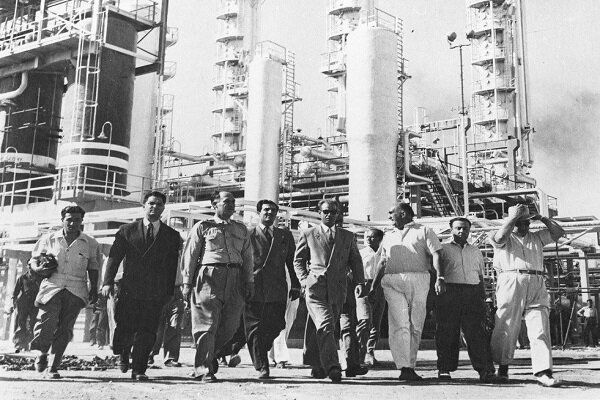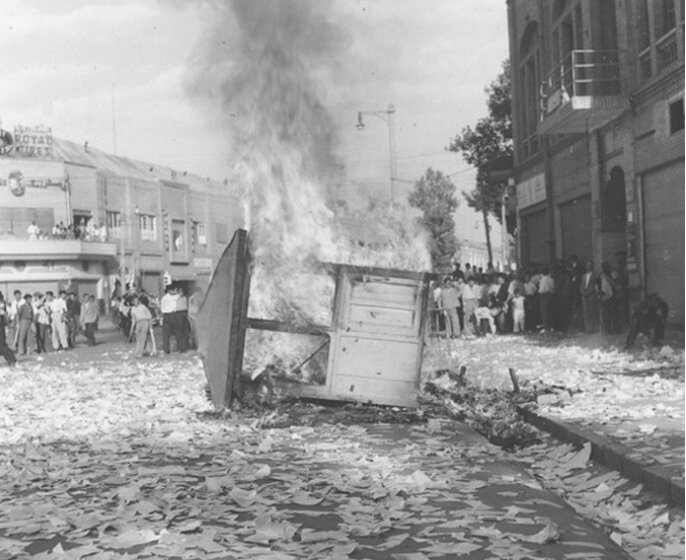UK, US role in coup d'état; It’s Always About Oil
1953 coup in Iran that occurred in August 1953 funded by the United States and the United Kingdom, removed Mohammad Mosaddegh from power and restored Mohammad Reza Shah Pahlavi as Iran’s king. Some 300 people died during the fighting in Tehrān.
With its strategic location and vast oil reserves, Iran was of special interest to the United States, the United Kingdom, and other powers. Britain had established a presence in the country during World War II to protect a vital supply route to its ally the Soviet Union and to prevent the oil from falling into German hands. After the war, the United Kingdom effectively retained control over Iran’s oil through the establishment of the Anglo-Iranian Oil Company.

Prime Minister Mohammed Mosadegh; Iran's Oil Nationalization
Mohammad Mossadegh became Prime Minister of Iran in 1951 and was hugely popular for taking a stand against the Anglo-Iranian Oil Company, a British-owned oil company that had made huge profits while paying Iran only 16% of its profits and often far less. His nationalization efforts led the British government to begin planning to remove him from power.
In October 1952, Mosaddegh declared Britain an enemy and cut all diplomatic relations. Britain was unable to resolve the issue unilaterally and looked to the United States for help.

CIA Overthrew Iran's Democracy In 4 Days
The plot, known as Operation Ajax, centered on convincing Iran’s monarch to issue a decree to dismiss Mossadegh from office.
In early August, Iranian CIA operatives threatened Muslim leaders with “savage punishment if they didn't oppose Mossadegh,” thereby giving the impression that Mossadegh was cracking down on dissent.
On August 16, 1953, Mohammad Reza Pahlavi formally dismissed Mossadegh and nominated the CIA’s choice, General Fazlollah Zahedi, as Prime Minister. The decrees were dictated by Donald Wilber, the CIA architect of the plan.
Soon, massive protests, engineered by the US, took place across the city to assist the coup. Mosaddegh was imprisoned for three years and then put under house arrest until he died in 1967.
Anglo-US coup condemned Iran to decades of oppression
The coup not only encouraged the Shah’s descent towards dictatorship, but it would later become a rallying cry in anti-US protests during the 1979 Iranian Revolution. Even now, Mossadegh is one of the most popular figures in Iranian history.
Indeed, Mosaddeq would not have fallen from power without actions undertaken by Iranians. But it is misleading to elide the US role in the coup, the memory of which continues to continue to haunt US-Iran relations. Even more importantly, the United States played a major role in stabilizing the Shah’s post-coup regime. Focusing on the events of August 19 alone obscures Washington’s ultimate aim with the coup: the return of Iran’s oil resources to foreign control, an objective the United States achieved roughly one year after Mosaddeq’s dramatic fall from power.

Consequences of the 1953 Coup in Iran, West Asia
Iran, West Asia, and, arguably, the whole world may well have been profoundly different. Apart from rewriting the destiny of Iran and its neighbors, the coup paved the way for a series of imperialist interventions and the toppling of democratically elected governments across the global south.
The coup altered the geopolitical landscape in West Asia, became a blueprint for a succession of covert US efforts to foster coups and destabilize governments in the '50s, and provided the Soviet Union with ideological ammunition during the Cold War.
Following the 1953 coup in Iran, the CIA orchestrated the successful Guatemalan coup one year later, failed to oust Syria's president in 1957; and suffered a black eye backing the unsuccessful military invasion of Cuba in 1961.

CIA publicly acknowledges involvement in the 1953 coup
For decades, the United States denied playing any part in the Iranian coup. But that position ended in 2009 when President Barack Obama acknowledged Washington's role.
In Britain, meanwhile, the government-funded BBC provided details in 2011 of how it broadcast anti-Mossadegh programs to undermine his government.
Secret files and memoirs of CIA operatives show that the CIA played a pivotal role in initiating and planning Operation Ajax, as the covert operation to oust Mossadegh was called.
On Aug. 19, 2013, the CIA publicly admitted for the first time its involvement in the 1953 coup against Iran's elected Prime Minister Mohammad Mossadegh.
As we saw in the issue of the nationalization of Iran's oil industry and the withdrawal of this national strategic resource from British control, controlling the strategic natural resources of countries has always been one of the motivations of hegemonic powers such as the US to launch endless and multi-dimensional wars against oppressed nations.
Although superiority in the world economy is one of the powerful motivations of the US's involvement in any part of the world, interference in oil-rich countries, countries rich in mineral resources and natural wealth of the world such as Iran, Afghanistan, Iraq, Syria, Venezuela, and Ukraine have always required excuses such as fighting terrorism, defending freedom, guaranteeing security, pre-emptive defense strategy, etc., so that under their protection, the dominating countries, especially US, could implement their policies.
While the US considers itself the observer of other countries to follow all general and common laws, principles, and policies, does not obey these principles and laws
By reviewing the pages of this country's history in the world, there are many cases of violation of common laws and principles in the world by Washington against countries that oppose its policies and even in some cases friends of this country.
Reported by Sahar Dadjoo

























Your Comment